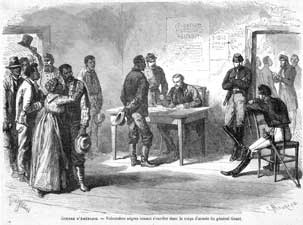 |
Negro
Volunteers enrolling in Gen. Grant's Army Corps, engraving
from Le Monde Illustre, 1863
|
| |
From
the beginning of the war, Northern African-Americans volunteered
for service, and escaping Southern slaves offered to fight for
the Union. Northerners at first feared that white soldiers would
not fight alongside black.
Not
until 1863, with white enlistment lagging and emancipation now
a war aim, did black recruitment begin in earnest. By the end
of the war, some 200,000 black men, the large majority former
slaves, had served in the Union army and navy. Many hailed from
loyal border states like Kentucky - excluded from the Emancipation
Proclamation - where military service remained for most of the
war the only legal route to freedom.
Within
the army African-Americans were anything but equal to white
soldiers. Serving in segregated units, black recruits were initially
paid less (an inequity corrected by Congress in 1865) and were
assigned mainly to fatigue duty, construction work, and menial
labor.
On the battlefield they were brave and effective soldiers against
an enemy that could be particularly hostile to them. If captured
by Confederate forces, they faced the prospect of summary execution
(as occurred at the Fort Pillow Massacre of 1864) or sale into
slavery. Yet even after proving themselves in battle, they did
not advance into the ranks of commissioned officers until late
in the war.
By
playing a central role in winning the war, black soldiers staked
a claim to equal rights in the postwar republic. "Once
let the black man get upon his person the brass letters U.S.,"
wrote Frederick Douglass, who crisscrossed the North recruiting
black volunteers, "and there is no power on earth which
can deny that he had earned the right to citizenship."
 Image
25 of 77
Image
25 of 77 


